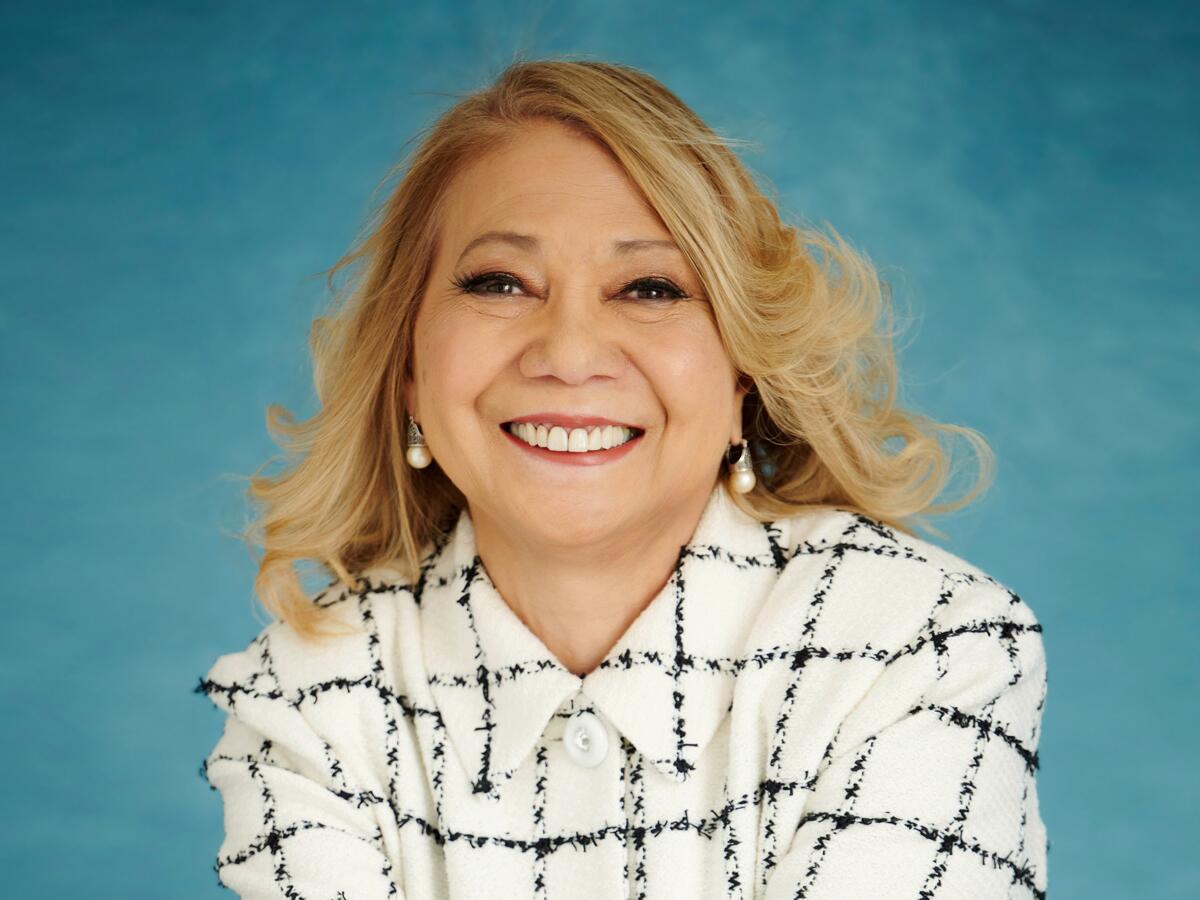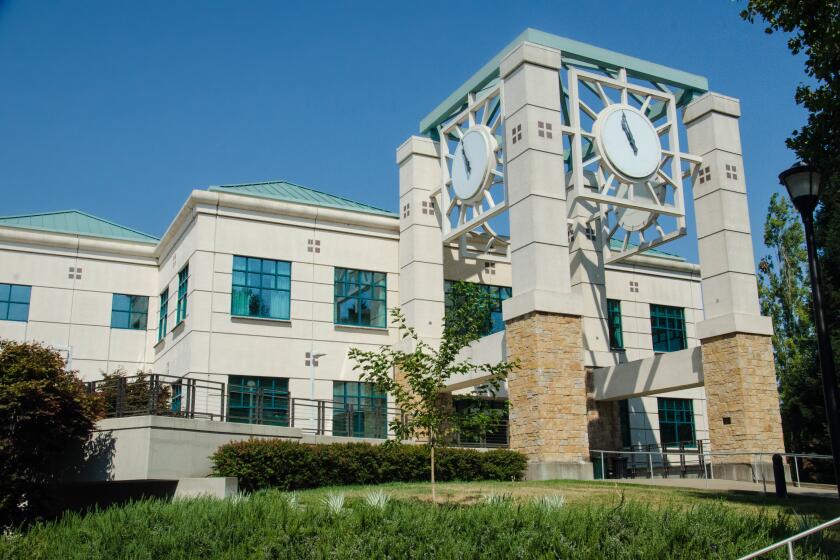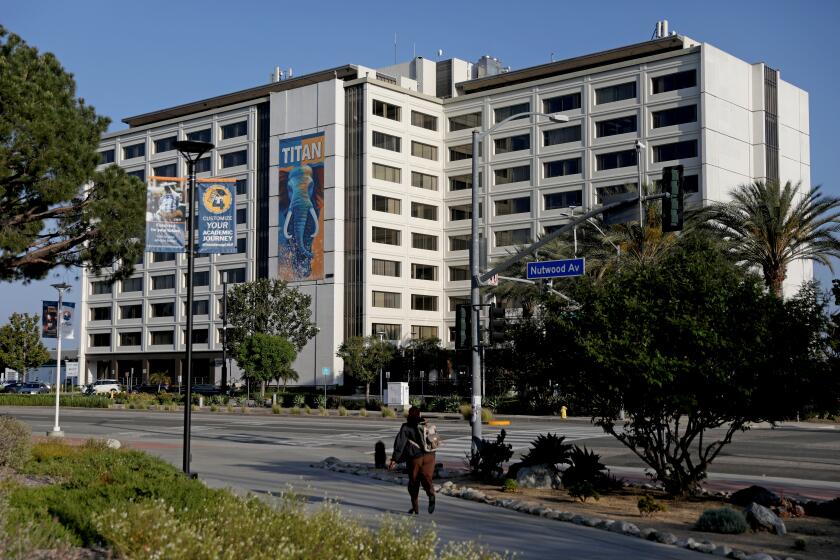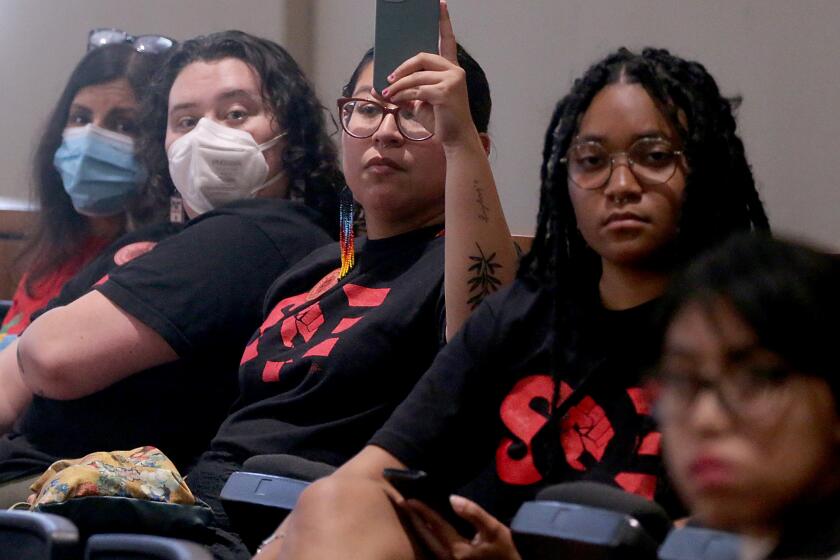Mildred García, champion of college access, is named CSU chancellor amid system crisis

- Share via
Mildred García, a longtime higher education leader who previously served as president of Cal State Dominguez Hills and Cal State Fullerton, was named chancellor of the California State University on Wednesday, trustees announced, stepping into the top position at a fraught time for the nation’s largest public four-year university system.
García, 71, who is currently president of the American Assn. of State Colleges and Universities, will become the 11th Chancellor and first Latina to lead the 23-campus system. She is credited with improving Cal State Fullerton’s four-year graduation rate by 65% and won recognition from a host of state and national education groups for closing the achievement gaps between Latinos and their white and Asian peers. Earlier in her career, García served as president of Berkeley College, a for-profit college with multiple campuses in New York and New Jersey.
In remarks over video, García said she’s focused on bolstering opportunities for students and spoke about how her work is informed by her background as the daughter of parents who moved to New York from Puerto Rico in search of opportunities for their children.
Growing up, she lived in tenement buildings in a diverse neighborhood filled with families striving to better their circumstances, she recalled. She attended public schools as they were integrating and credited education with exposing her to the violin, French and museums.
“I was given the opportunity, the opportunity to excel. And that is one of the most important lessons — the opportunity for all to reach their highest potential,” she said.
García who will draw an annual salary of $795,000 and $80,000 in deferred compensation along with housing and auto allowances, will step into the role on Oct. 1.
Wenda Fong, chair of the CSU Board of Trustees, praised García for her optimism and her dedication to students from diverse backgrounds.
“In our 11th Chancellor, the CSU has an extraordinarily skilled, dedicated and principled leader who has devoted her professional life to advancing the core values of our university system,” Fong said. “Perhaps even more importantly, she lives out those core values each and every day.”
García returns to a university system beleaguered by widespread sexual misconduct among top administrators, and intense criticism over its handling of such cases. García’s predecessor, Joseph I. Castro, was forced to resign last year after he came under fire for his handling of sexual misconduct cases during his time as president at Fresno State University.
Castro wrote a glowing recommendation letter for a campus vice president — who left the university with a $260,000 payout — after an investigation found credible evidence the administrator engaged in sexual misconduct against an employee.
A slew of revelations across the system have followed. Times investigations found inconsistencies in the way campuses report sexual misconduct cases and demonstrated how campuses failed to properly investigate wrongdoing by top administrators.
In an interview on Wednesday, García said she is committed to implementing reforms recommended by a law firm commissioned by the trustees to examine the system’s Title IX practices. The suggestions include a sweeping change in the role of the chancellor’s office to identify trends and breakdowns in data collection, and creating a pool of trained investigators to assist campus employees, who must handle multiple responsibilities and are not capable of fully investigating complaints.
“I know that I have to hold people accountable. There is no strike one, strike two, strike three,” she said. “There’s strike one.”
Shiwali Patel, director of Justice for Student Survivors and senior Counsel at the National Women’s Law Center said García must work to rebuild trust with students and employees, and demonstrate that she will respond appropriately and effectively to sexual harassment.
“If students don’t have trust in the leadership in the institution, then that’s going to impact whether or not they’re going to turn to the institution if they experience sexual harassment,” she said. “And in order for institutions to be able to address it, and to prevent this from happening again, they need to know how students are being impacted.”
Recent revelations about how California State University handled sexual harassment and workplace retaliation complaints have rocked the nation’s largest four-year public university system.
García must also contend with other serious challenges, including declining enrollment, stagnant wages for an increasingly disgruntled workforce and, more recently, a $1.5-billion budget gap that’s forced trustees to consider raising tuition, to the dismay of students.
During discussion about García’s compensation, which was approved 18-2-1, trustees voiced strong support for her but two members raised concerns about her salary. Castro drew an annual $625,000 salary.
Trustee Douglas Faigin questioned whether it was the right time to authorize the salary when the system is strapped for money, and when employees across the system — from maintenance workers to instructors to student workers — are struggling to pay for basic necessities.
“The faculty, the staff are hearing from us that we want to treat them as fairly as we can. We want to give them as much as we can,” he said. “But at the same time, the cupboard is bare. And we’ve got to take all those things into consideration.”
But others sharply rejected the notion the system is overpaying García, arguing her pay is comparable — and in some instances lower — than system leaders elsewhere. Michael V. Drake was awarded a base salary of $890,000 when he was appointed president of the University of California in 2020.
“We need to recognize that this job is one of the most important jobs in the state of California,” said Trustee Jack McGrory. “And to do anything less than that, I think is giving up on our responsibilities.”
Trustee Jack Clarke added that García’s salary was thoughtfully developed.
“This was not just thrown up against the dartboard. We thought about this,” he said. “I am sure that there will be members of our communities who might criticize this. And we have to be strong enough to explain to our respective community members, this is the right thing to do.”
García earned a doctorate and a master’s degree in higher education from Teachers College at Columbia University, and a master’s degree in business education and higher education from New York University.
She also holds a bachelor’s degree from Baruch College, which is part of the City University of New York system, and an associate’s degree from New York City Community College.
As president of the American Assn. of State Colleges and Universities, an organization that represents nearly 400 colleges and universities, García advocates for public higher education by working to influence federal policy.
A new report reviewing Cal State’s finances found the university system is coming up 15% short of its total costs, leaving an almost $1.5-billion funding gap. The report recommends implementing tuition increases.
Before leading the association, she was president of Cal State Fullerton for five years. The campus graduated more Latino students than any other campus in California during her time there, and the second most in the nation.
García, who is of Puerto Rican descent, has said she can relate to many Cal State students because she shares their modest beginnings. Nearly half of the 460,000 students enrolled in the system are Latino, and many come from low-income families.
Officials say the annual tuition increase is necessary to help contend with a nearly $1.5-billion budget gap, with students paying $342 more the first year alone.
During an inauguration speech in 2008, at Cal State Dominguez Hills, which she led from 2007 to 2012, García recounted how she had to move into New York City public housing with her mother and six siblings after her father died. One of her friends died from AIDS and another from a drug overdose.
“But I held to values taught by my parents,” García said. “The only inheritance a poor family leaves its children is a good education.”
Dominic Treseler, president of the California State University Student Assn. said it is crucial for García to focus on closing equity gaps by boosting declining graduation and retention rates among Black students— issues the incoming Chancellor has named as priorities.
Audrey Dow, senior vice president at the Campaign for College Opportunity, a policy and research organization dedicated to getting more students to through college, applauded García’s appointment and said she has a demonstrated history of improving education outcomes students for students from marginalized backgrounds.
Garcia’s success in closing gaps for Latino students at Cal State Fullerton was a model for other campuses, she said. “We now have a leader who knows how to do that.”
More to Read
Sign up for Essential California
The most important California stories and recommendations in your inbox every morning.
You may occasionally receive promotional content from the Los Angeles Times.

















